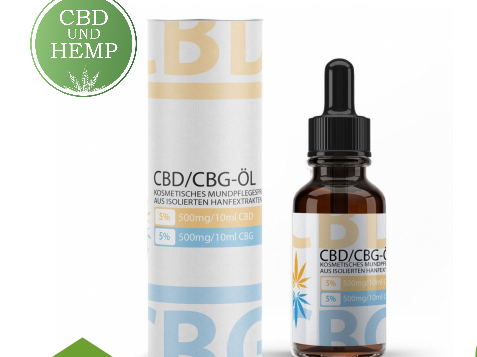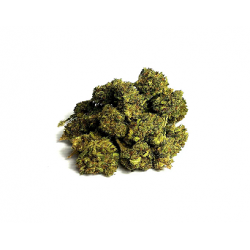
CBG may be able to improve the following health conditions: Inflammatory bowel disease. CBG appears to reduce inflammation associated with inflammatory bowel disease (research in mice) Glaucoma. Medical cannabis appears to be effective in the treatment of glaucoma, and CBG may be responsible in part for its effectiveness. A study published in 2008 suggests that CBG may be effective in treating glaucoma because it reduces intraocular pressure. Bladder dysfunctions. Some cannabinoids appear to affect bladder contractions. A 2015 study looked at how five different cannabinoids affect the bladder and concluded that CBG shows the most promise in treating bladder dysfunctions. Huntington's disease. CBG may have neuroprotective properties in a neurodegenerative disease called Huntington's disease. The study concluded that CBG may be promising in the treatment of other neurodegenerative conditions. Bacterial infections. CBG can kill bacteria, especially methicillin-resistant Staphylococcus aureus (MRSA), which causes drug-resistant infections. These infections are difficult to treat and can be quite dangerous. Cancer. A 2014 study examined colon cancer in rats and concluded that CBG may reduce the growth of cancer cells and other tumors. Anorexia. A 2016 study in rats concluded that CBG stimulates appetite. Appetite-stimulating cannabinoids can be used to help patients such as HIV or cancer.
Learn about CBG, the new cannabinoid in the cannabis block
CBG v CBD
Cannabigerol (CBG) is a cannabinoid, i.e. one of the many components found in cannabis plants. The best known cannabinoids are cannabidiol (CBD) and tetrahydrocannabinol (THC), but more recently there has been a growing interest in the potential benefits of cannabigerol (CBG).
CBG is considered a precursor to other cannabinoids. This is because CBG-A, the acid form of CBG, decomposes when heated to CBG, CBD, THC, and CBC (cannabis chromium, another cannabinoid).
How do you relate to the CBD?
Neither CBD nor CBG are toxic cannabinoids, meaning they have no psychoactive effect. Both interact with the same receptors. However, CBG appears to have different functions and health benefits than CBD.
The main difference between CBD and CBG can be traced back to the level of research available. There has been quite a bit of research on CBD, but not so much on CBG. This means that as CBG becomes more popular, more studies are likely to be made about it soon.
What are the benefits?
While research on CBG is limited, there are studies that suggest a number of benefits.
CBG may be able to improve the following health conditions:
- Inflammatory bowel disease. CBG appears to reduce inflammation associated with inflammatory bowel disease (research in mice)
- Glaucoma. Medical cannabis appears to be effective in the treatment of glaucoma, and CBG may be responsible in part for its effectiveness. A study published in 2008 suggests that CBG may be effective in treating glaucoma because it reduces intraocular pressure.
- Bladder dysfunctions. Some cannabinoids appear to affect bladder contractions. A 2015 study looked at how five different cannabinoids affect the bladder and concluded that CBG shows the most promise in treating bladder dysfunctions.
- Huntington's disease. CBG may have neuroprotective properties in a neurodegenerative disease called Huntington's disease. The study concluded that CBG may be promising in the treatment of other neurodegenerative conditions.
- Bacterial infections. CBG can kill bacteria, especially methicillin-resistant Staphylococcus aureus (MRSA), which causes drug-resistant infections. These infections are difficult to treat and can be quite dangerous.
- Cancer. A 2014 study examined colon cancer in rats and concluded that CBG may reduce the growth of cancer cells and other tumors.
- Anorexia. A 2016 study in rats concluded that CBG stimulates appetite. Appetite-stimulating cannabinoids can be used to help patients such as HIV or cancer.
While these studies are promising, it is important to note that much more research is needed to understand how CBG works in the organization.
Does it cause side effects?
Very little is known about the side effects of CBG oil or other forms of CBG. So far, it seems to be well tolerated in rats, but there is not enough research to tell us much about the possible side effects in humans.
Do you interact with any medication?
Not much is known about whether CBG can interact with over-the-counter or prescription drugs, as well as vitamins or supplements.
If you are taking any medication, it is best to consult your healthcare provider before trying CBG oil. It is especially important if you are taking a medicine that contains a grapefruit warning.
Do not stop taking medications to use CBG oil unless your doctor tells you otherwise.

Source. www.healthline.com
facts
CBG may be able to improve the following health conditions:
Inflammatory bowel disease. CBG appears to reduce inflammation associated with inflammatory bowel disease (research in mice)
Glaucoma. Medical cannabis appears to be effective in the treatment of glaucoma, and CBG may be responsible in part for its effectiveness. A study published in 2008 suggests that CBG may be effective in treating glaucoma because it reduces intraocular pressure.
Bladder dysfunctions. Some cannabinoids appear to affect bladder contractions. A 2015 study looked at how five different cannabinoids affect the bladder and concluded that CBG shows the most promise in treating bladder dysfunctions.
Huntington's disease. CBG may have neuroprotective properties in a neurodegenerative disease called Huntington's disease. The study concluded that CBG may be promising in the treatment of other neurodegenerative conditions.
Bacterial infections. CBG can kill bacteria, especially methicillin-resistant Staphylococcus aureus (MRSA), which causes drug-resistant infections. These infections are difficult to treat and can be quite dangerous.
Cancer. A 2014 study examined colon cancer in rats and concluded that CBG may reduce the growth of cancer cells and other tumors.
Anorexia. A 2016 study in rats concluded that CBG stimulates appetite. Appetite-stimulating cannabinoids can be used to help patients such as HIV or cancer.


















